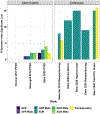Posttraumatic stress disorder: from gene discovery to disease biology
- PMID: 33583458
- PMCID: PMC8364573
- DOI: 10.1017/S0033291721000210
Posttraumatic stress disorder: from gene discovery to disease biology
Abstract
Posttraumatic stress disorder (PTSD) is a complex mental disorder afflicting approximately 7% of the population. The diverse number of traumatic events and the wide array of symptom combinations leading to PTSD diagnosis contribute substantial heterogeneity to studies of the disorder. Genomic and complimentary-omic investigations have rapidly increased our understanding of the heritable risk for PTSD. In this review, we emphasize the contributions of genome-wide association, epigenome-wide association, transcriptomic, and neuroimaging studies to our understanding of PTSD etiology. We also discuss the shared risk between PTSD and other complex traits derived from studies of causal inference, co-expression, and brain morphological similarities. The investigations completed so far converge on stark contrasts in PTSD risk between sexes, partially attributed to sex-specific prevalence of traumatic experiences with high conditional risk of PTSD. To further understand PTSD biology, future studies should focus on detecting risk for PTSD while accounting for substantial cohort-level heterogeneity (e.g. civilian v. combat-exposed PTSD cases or PTSD risk among cases exposed to specific traumas), expanding ancestral diversity among study cohorts, and remaining cognizant of how these data influence social stigma associated with certain traumatic events among underrepresented minorities and/or high-risk populations.
Keywords: EWAS; GWAS; neuroimaging; posttraumatic stress disorder (PTSD); transcriptomics.
Conflict of interest statement
Conflict of interest
Dr. Polimanti is paid for their editorial work on the journal Complex Psychiatry. Dr. Wendt declares no competing interests.
Figures


References
-
- American Psychiatric Association. (2013). Trauma- and Stressor-Related DisordersDiagnostic and Statistical Manual of Mental Disorders (Fifth ed.).
-
- Atkinson EG, Maihofer AX, Kanai M, Martin AR, Karczewski KJ, Santoro ML, … Neale BM (2020). “Tractor”: A framework allowing for improved inclusion of admixed individuals in large-scale association studies. bioRxiv, 2020.2005.2017.100727. doi: 10.1101/2020.05.17.100727 - DOI
-
- Ball TM, & Stein MB (2012). The Oxford Handbook of Traumatic Stress Disorders (Beck JG & Sloan DM Eds. 1st ed.): Oxford Handbooks Online.
Publication types
MeSH terms
Grants and funding
LinkOut - more resources
Full Text Sources
Other Literature Sources
Medical

